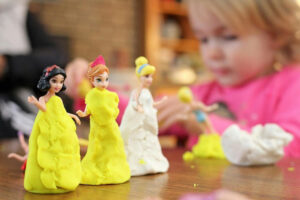Child & Adolescent Therapy
WHAT IS CHILD/ ADOLESCENT THERAPY LIKE?
Unlike adult talk-therapy, kids often do not have the verbal or processing skills to simply talk through their problems and make necessary changes in their behavior and thinking. Therapists usually use art and play therapy to help children process their feelings, learn to express them, and develop coping strategies. We do a lot of coloring, games, puzzles, imaginary play, and sensory activities targeted at the specific child behaviors or feelings being addressed. Sometimes we wonder who has more fun in these sessions: the kids or their therapists!

Child therapy can be a relatively slow process depending on the issue, but it moves much faster and change is better maintained when the family is actively involved to support the child’s progress. We encourage meetings with family members in order to teach parents’ skills and/or help you to respond in a way that fosters your child’s growth.
Adolescents relax as they get to know their therapist and realize that the therapist is there to support them and help them deal with life rather than to join the parents to gang up on them. With teens and tweens we may use therapeutic games, journaling, and art, with talk therapy depending on their openness and preferences. We work with the family to find solutions for everyone, but it is important for adolescents to feel validated and that their therapist is an advocate for them.

ART THERAPY INTERVENTIONS
 Art is helpful for people who struggle to identify or talk about their feelings; it is especially helpful for children who don’t always have the vocabulary to fully express their feelings through standard talk therapy. Art is a nonthreatening way for individuals and families to open up and learn more about themselves and each other.
Art is helpful for people who struggle to identify or talk about their feelings; it is especially helpful for children who don’t always have the vocabulary to fully express their feelings through standard talk therapy. Art is a nonthreatening way for individuals and families to open up and learn more about themselves and each other.
The use of art in therapy allows clients to express themselves in new ways and often find new insights about themselves. We use a variety of mediums including watercolor painting, crayon, chalk, markers, charcoals, pencils, and sculpting materials. Through a variety of different therapist guided activities, you can explore and increase your understanding of emotions and inner thoughts. Artistic ability is not necessary for a great therapy experience!
THERE ARE MANY ADDITIONAL BENEFITS TO USING ART IN THERAPY INCLUDING:
- Art can help people to recognize and deal with emotional conflicts
- Art increases self-awareness
- It can increase creativity and problem solving abilities
- Art helps individuals learn to better manage their behavior
- It can increase an individual’s ability to cope with stressors
- Art helps to develop social skills
- Art can help people to stay better connected with reality
- It can help to reduce anxiety
- The use of art helps to increase self-esteem
- It can reduce discomfort associated with talking about difficult subjects like past trauma
- And last but not least: It’s fun!
PLAY THERAPY
Play therapy involves the use of toys, games, and imaginative play rather than standard talk therapy. This model is primarily used with children, but it can be helpful for those who struggle with self-expression as well. Unstructured play can help the therapist to assess areas of clinical concern or possible relationship issues.
 The therapist can also use structured activities to teach skills such as impulse control and coping strategies. Through the use of play therapy, kids and adolescents are able to act out their situation or emotional struggles in a smaller scale; while they may feel they have little control over certain aspects of their life, in play they can take control and work through their feelings.
The therapist can also use structured activities to teach skills such as impulse control and coping strategies. Through the use of play therapy, kids and adolescents are able to act out their situation or emotional struggles in a smaller scale; while they may feel they have little control over certain aspects of their life, in play they can take control and work through their feelings.
We might allow the child to start with less structured play or in some cases we might give basic guidelines such as, “Let’s play house; tell me about this family.” As difficult feelings surface in play, the child is able to face them and better cope with them. Additionally, kids can express their difficult feelings such as their anger or pain in a safe and healthy way. And of course play therapy is nonthreatening and fun for kids so they enjoy coming to therapy.
ADDITIONAL BENEFITS OF PLAY THERAPY INCLUDE:
- It can improve family communication and bonding
- It can help kids to develop better coping and problem solving strategies
- It can improve emotional expression
- Play can increase empathy and social skills
- Kids develop more responsibility for their behaviors
- It can increase confidence and improve self-esteem
Call or message us today to see if we are a good fit for your child and family.
